|
|
|
Sort Order |
|
|
|
Items / Page
|
|
|
|
|
|
|
| Srl | Item |
| 1 |
ID:
103588
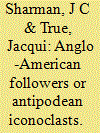

|
|
|
|
|
| Publication |
2011.
|
| Summary/Abstract |
This article examines the results of the world's largest ever survey of international relations (IR) scholars with an eye to establishing the particularities of the discipline in Australia and New Zealand. The survey covered the areas of teaching, research, the structure of the profession and scholars' views on foreign policy. From these results, this paper compares IR in New Zealand and Australia, and discusses the extent to which the discipline in these two countries is distinctive from its overseas counterparts, especially in the United States and the United Kingdom. The particular areas of focus include the degree to which the field in Australasia conforms to or differs from US or Commonwealth identities; epistemological and gender divides; the distinctive foci of what IR scholars in both countries teach and research; which publications are favoured and disfavoured; and the contrasting linkages between academia and the world of government and policy. We conclude with some suggestions about how the field in both countries might be improved.
|
|
|
|
|
|
|
|
|
|
|
|
|
|
|
|
| 2 |
ID:
130964
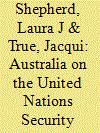

|
|
|
|
|
| Publication |
2014.
|
| Summary/Abstract |
Until 2015, Australia is uniquely positioned on the world stage to make a real difference to women's lives in conflict, transitional and post-conflict countries by ensuring they are actively represented in all peace negotiations1. The Australian government has secured not only a non-permanent seat on the United Nations Security Council (UNSC), but also a seat on the Executive Board of UN Women, the UN entity charged with enhancing gender equality and the empowerment of women. These represent two internationally significant avenues through which the Australian government can fulfil its promise to engage women in the governance of international peace and security, furthering the UN's Women, Peace and Security (WPS) agenda. This agenda, the primary architecture of which comprises seven interrelated UNSC Resolutions dating back to UNSC Resolution 1325 (2000), mandates that women should be represented at and actively participate in all peace negotiations, as well as making binding international commitments to eliminate violence against women and protect women's rights
|
|
|
|
|
|
|
|
|
|
|
|
|
|
|
|
| 3 |
ID:
160564
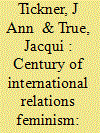

|
|
|
|
|
| Summary/Abstract |
We examine feminism in international relations from the emergence of women's peace pragmatism during WWI to the development of the United Nations (UN) Women, Peace, and Security (WPS) agenda a century later. We argue that feminism did not come late to international relations. Rather, international relations came late to feminism. Moreover, we show how the principles articulated by women peace activists at the 1915 Hague Conference represent distinct contributions to the discipline. These principles reflect a pragmatic approach derived from women's experiences of promoting peace and inclusion. The pragmatism of these principles is echoed by, and further developed in, four pillars of the WPS agenda—as shaped by advocates of women's rights, working through processes of trial and error, to gain state support for advance principles of equal and lasting peace. States may have rejected discussion of women's rights as an appropriate matter for international negotiations in 1915. But with the evolution of women's political rights during the twentieth century, it is now possible to advance a feminist perspective on international peace and security. By recovering neglected aspects of the last century of international relations’ feminism, this article helps further an alternative, pragmatist perspective on ways of knowing and doing international relations.
|
|
|
|
|
|
|
|
|
|
|
|
|
|
|
|
| 4 |
ID:
187032
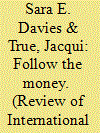

|
|
|
|
|
| Summary/Abstract |
The Women, Peace and Security (WPS) agenda and women's participation in peace processes are strongly supported by states. Yet financing to support the implementation of WPS has lagged behind overt international commitments to the agenda. WPS scholars and practitioners have highlighted the funding shortfalls for enabling WPS implementation and continued under-investment in gender-inclusive peace. In this article, we ask how much are donor states financially backing the implementation of gender-inclusive peace agreements which they promote? We use a high ambiguity-conflict model of policy implementation to explore the mechanisms of bilateral and multilateral financing for gender-inclusive peace. We trace to what extent international investments are supporting specific gender provisions in two progressive gender-inclusive peace processes, the 2016 Colombian Peace Agreement and 2015 Comprehensive Peace Agreement in the Philippines. In both case studies, we reveal a drastic gap between the international donor rhetoric and the funding. Patterns of financial investment do not follow nor support the life cycle of inclusive peace processes. We suggest key strategies for further research to address this policy and recommend that all gender provisions of peace agreements be monitored in-country and all gender-responsive investments be tracked and evaluated.
|
|
|
|
|
|
|
|
|
|
|
|
|
|
|
|
| 5 |
ID:
184226
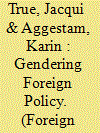

|
|
|
|
|
| Summary/Abstract |
This article seeks to explain the rise of pro-gender norms and feminist strategies in foreign policy, which are increasingly salient in global politics. How can this trend be theorized? In what ways is this development resisted and contested by other states and international actors? To what extent can we trace continuity and change in regard to gender and foreign policy? To address these major research questions and to spur cross-national comparative studies, this article advances a theoretical framework on gendering foreign policy. It draws on two strands of research, which rarely engage with one another: international feminist theory (IFT) and foreign policy analysis (FPA). We identify three ways in which comparative analysis of gender in foreign policy can be advanced: first, by highlighting the variations of pro-gender norms and enhancing the analytical assessment of cross-national trends; second, by generating a more robust explanation of the rise, embeddedness, and continuity of, as well as resistance to, pro-gender norms in foreign policy in similar and diverse contexts; and third, by examining both continuity and change in pro-gender norms in order to reveal the contestation around gender, which is at the heart of foreign policy.
|
|
|
|
|
|
|
|
|
|
|
|
|
|
|
|
| 6 |
ID:
080624


|
|
|
|
|
| Publication |
2008.
|
| Summary/Abstract |
Decisions that affect the life chances and wellbeing of citizens are increasingly being made in international settings that are only indirectly connected to the democratic institutions where those citizens have a voice. Global and regional governance organizations not only lack the democratic legitimacy of states but also there are few mechanisms that make them accountable to the citizens that their decision making most affects. Civil society groups have exposed this gap between the jurisdiction and the impact of supra-state organizations and have proposed various ways of addressing it. Feminist analysis has highlighted the masculine preserve of traditionally closed-door multilateral trade and security discussions and negotiations. It has also highlighted the unequal and deeply structural gender impact of this style of policy making. Women's movements have found international organizations to be especially challenging institutional settings within which to achieve policy influence. Yet transnational feminist networks have the political and ethical resources to make global governance organizations more accountable to a broader constituency. This article explores this phenomenon through an examination of the Women Leaders' Network (WLN) and its efforts to make Asia Pacific Economic Cooperation more accountable to women as political and economic actors. The WLN is the only women's transnational advocacy network to have directly and routinely engaged with an economic intergovernmental organization. An analysis of the limits and potentials of the WLN model highlights accountability issues for APEC (Asia Pacific Economic Cooperation) and other regional or global governance organizations, as well as for the WLN and transnational civil society networks more generally
|
|
|
|
|
|
|
|
|
|
|
|
|
|
|
|
| 7 |
ID:
183514


|
|
|
|
|
| Summary/Abstract |
Living through global transformations – including our current pandemic – requires imagination to see through to the other side. How can Australian IR scholars contribute new understandings of the prospects for global change and security when they are so sorely needed? This essay reflects on two themes: First, the important role of Australian IR scholars and students in theorising change and envisioning alternative futures in a national context less constrained by the trappings of power and enduring forced isolation during the COVID-19 pandemic; and second, the significance of increasing gender diversity in political leadership for future transformations in international relations. A productive feminist subfield of IR scholarship has flourished in Australian universities, however, navigation of post-COVID global politics requires all IR scholars to critically examine the gendered games that political leaders, institutions, inter-state and global civil society actors play. Such gendered games both fuel and mitigate the dynamics of conflict and insecurity.
|
|
|
|
|
|
|
|
|
|
|
|
|
|
|
|
| 8 |
ID:
183707
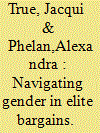

|
|
|
|
|
| Summary/Abstract |
A growing body of scholarship connects the participation of women and the inclusion of gender provisions to the sustainability of peace settlements. But how do women's groups navigate gender power structures and gendered forms of violence within complex and fragile political bargaining processes aimed at ending large-scale conflict? The 2016 Colombian peace agreement, internationally applauded for its inclusion of strong gender provisions and women's participation as negotiators and peace advocates, is a significant case for examining these questions. Drawing on original case material, including interviews of key actors on different sides of the conflict – this article analyses the political bargaining dynamics within and among women's movements, the Santos government and the Revolutionary Armed Forces of Colombia (Fuerzas Armadas Revolucionarias de Colombia, FARC). We argue that the inclusion of women was pivotal in transforming the elite bargaining process and power structures of Colombian society enabling a gender-based approach to the substantive peace agenda addressing transitional gender justice for sexual violence survivors and gender-equal redistribution through land and rural reform programmes. The study suggests that deeply situated political bargaining analysis is essential to navigating gender in elite bargains rather than a one-size-fits-all approach to inclusive peace.
|
|
|
|
|
|
|
|
|
|
|
|
|
|
|
|
| 9 |
ID:
180831
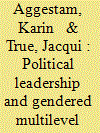

|
|
|
|
|
| Summary/Abstract |
Gender intersects as a major fault-line in increasingly polarized, contemporary global politics. Many democratic states in the global North and South have adopted pro-gender norms in their foreign policies, while other states and populist regimes have resisted the promotion of gender equality and women's rights. This article analyses how political leaders harness gender dynamics to further their power, status and authority to act in foreign policy. While scholarship on foreign policy analysis has emphasized the role of individuals, political leaders and their followers, and of two-level games balancing domestic and international pressures, we advance a novel theoretical concept: ‘gendered multilevel games’. This new concept highlights the gendered dynamics of the problem of agency and structure in foreign policy, which are generated from the interactions between the domestic, international and transnational levels, and reach within and across states. To illustrate the utility of this concept, we analyse foreign policy leadership and the variation in gendered multilevel games in four vignettes: (1) hyper-masculinity and revisionist leadership; (2) normative leadership and gendered nation-branding; (3) compassionate leadership and gendered transnational symbolism; and (4) contested leadership on pro- and anti-gender norms in foreign policy. Importantly, these empirical illustrations show how adept political leaders navigate pro- and anti-gender norms to achieve core and often divergent foreign policy goals.
|
|
|
|
|
|
|
|
|
|
|
|
|
|
|
|
| 10 |
ID:
085573
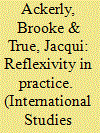

|
|
|
|
|
| Publication |
2008.
|
| Summary/Abstract |
How can we study power and identify ways to mitigate its abuse in the real world when we, as researchers, also participate in the projection of power through knowledge claims? Informing epistemological perspective, theoretical choices, research design, data collection, data analysis, exposition of findings, and venues for sharing findings, feminism offers many answers. We argue that the most important feminist tool for guiding international relations scholarship is the research ethic. This research ethic is the research practice associated with a critical feminist theory that is reflective of the normative concerns of constructivist, critical, post-modern, and post-colonial theories. It offers International Relations researchers feminist standards for assessing research despite feminism's multiplicity and its defiance of attempts to delimit its practice.
|
|
|
|
|
|
|
|
|
|
|
|
|
|
|
|
| 11 |
ID:
142495
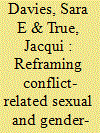

|
|
|
|
|
| Summary/Abstract |
Over the past decade, significant global attention has been paid to the issue of ‘widespread and systematic’ sexual and gender-based violence (SGBV). To contribute to the prevention of SGBV, researchers have examined the relationship between the presence of armed conflict and the causes of SGBV. Much of this causal literature has focused on the individual and group perpetrator dynamics that fuel SGBV. However, we argue that research needs to lay bare the roots of SGBV in normalized and systemic gender discrimination. This article brings back structural gender inequality as a causal explanation for SGBV. In order to better understand and prevent SGBV, we propose a critical knowledge base that identifies causal patterns of gendered violence by building on existing indicators of gender discrimination.
|
|
|
|
|
|
|
|
|
|
|
|
|
|
|
|
| 12 |
ID:
110829


|
|
|
|
|
| Publication |
2012.
|
| Summary/Abstract |
The diffusion of international norms and their effects on policy and political behaviour are central research questions in international relations. Informed by constructivism, prevailing models are marked by a crucial tension between a static view of norm content and a dynamic picture of norm adoption and implementation. Observing that norms continue to evolve after they emerge, we argue that a discursive approach offers a more promising way forward for theorizing and analysing the life cycles of international norms. We present a view of norms as processes, calling attention to both 'internal' and 'external' sources of dynamism. We illustrate this theory by tracing and comparing the life cycles of two global equality norms: gender-balanced decision-making and gender mainstreaming. We find that these norms emerged from two distinct policy realms, and after briefly converging in the mid-1990s, have since developed largely separately from, and often in tension with, one another.
|
|
|
|
|
|
|
|
|
|
|
|
|
|
|
|
| 13 |
ID:
130965
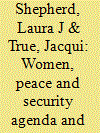

|
|
|
|
|
| Publication |
2014.
|
| Summary/Abstract |
What is the 'Women, Peace and Security agenda' and why is it relevant now for Australia? During 2013-14, Australia is a non-permanent member of the United Nations Security Council and, with a growing foreign military, peacebuilding and aid presence around the world, the country must play a role in preventing conflict, in protecting women and girls from violence before, during and after conflict, and in encouraging the participation of women in these peace and security decisions in order to create the structural, gender-equal conditions for lasting peace. This article highlights the promises made by Australia during the campaign for the Security Council seat. It evaluates the credibility of the campaign commitments by assessing Australia's foreign policies and overseas aid spending on women and peacebuilding in Asia and the Pacific; exploring the avenues for government-funded research on women, peace and security issues to influence government policies and programs; and taking stock of the government's record of engaging with civil society in developing and carrying out its National Action Plan on Women, Peace and Security. The article suggests concrete actions that would allow Australia to fulfil its promises and progress its international leadership on the major pillars of the Women, Peace and Security agenda.
|
|
|
|
|
|
|
|
|
|
|
|
|
|
|
|
|
|
|
|
|